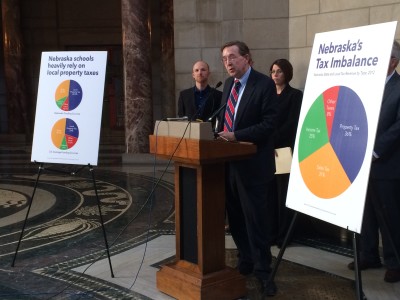OpenSky, others stand with Sen. Davis on LB 280
LINCOLN — Property taxes will be lowered about $407 million statewide and cuts to schools and other key services will be avoided under LB 280 — a bill introduced by Sen. Al Davis of Hyannis.
The plan also will help reduce Nebraska’s reliance on property taxes to fund schools, Davis said while surrounded by a politically diverse group of supporters at a news conference at the State Capitol.

Sen. Al Davis, center, announces his proposal — LB 280 — to reduce reliance on property taxes to fund K-12 on Jan. 13 as OpenSky’s Renee Fry and Dylan Grundman look on.
“Nebraskans across the state have made it clear that lower property taxes are their main concern when it comes to taxes,” Davis said. “But any plan to lower property taxes must also account for the revenue needed to maintain our state’s great schools and other key services. This proposal does that.”
The proposal does not reduce funding for any school district, Davis said, and would:
- Reduce agricultural land valuation from 75 percent to 65 percent for K-12 funding formula purposes only. This would direct more state aid to school districts with high agricultural land values without reducing revenue for other local services. Many schools that don’t get equalization aid now would under this change.
- Expand the resource calculation of the school aid formula by adding a local income tax tied to a reduction in property taxes. This would assess a community’s ability to pay based on property and income wealth, would lower property taxes across the state and would keep the local income tax revenues with the local school district. Those school districts with unmet needs can raise additional dollars by increasing their local income tax rate by a supermajority vote of the school board.
- Create a foundation aid component. The proposal would provide a per-pupil amount of $500 to every district, regardless of whether a school receives equalization aid or not, to help restore aid to districts that have lost equalization funding due to unprecedented growth in agricultural land values.
Under the plan, Davis said all Nebraskans would see lower property taxes, many would see lower overall taxes and any school district that would have reduced state aid would see that funding made up for in local income tax revenue.
Nebraska relies heavily on property taxes to fund schools and this has serious statewide ramifications, said Renee Fry, executive director of OpenSky Policy Institute, one of the groups that supports Sen. Davis’ message.
“Recent cuts in state aid have increased our reliance on property taxes to fund schools and our high agricultural land values have allowed us to make up the difference,” Fry said. “If agricultural land values are to drop, we’ll either need dramatic increases in state school aid or we will have to make serious cuts to our state’s schools.”
Davis’ proposal will help lessen Nebraska’s reliance on property taxes to fund schools as well as lower property taxes for the state’s residents, Fry said.
Below are comments from other supporters of Sen. Davis’s proposal:
“Our state’s increased reliance on property taxes to fund schools has seriously affected members of our agricultural community, who haven’t seen their incomes grow at the same rate as their property taxes. Sen. Davis’s plan addresses that issue and helps protect our state’s vital investment in schools.” — Kevin Cooksley, president of the Nebraska State Grange, a member of the Nebraska Cattlemen and a former member of the Broken Bow school board.
“Nebraska retirees are typically on fixed incomes but are paying more and more in property taxes every year. Sen. Davis’s plan will help our retirees by striking a better balance between income and property taxes for funding our schools.” — Mark Intermill, advocacy director of AARP Nebraska.
View a pamphlet with more information about Sen. Davis proposal online.
